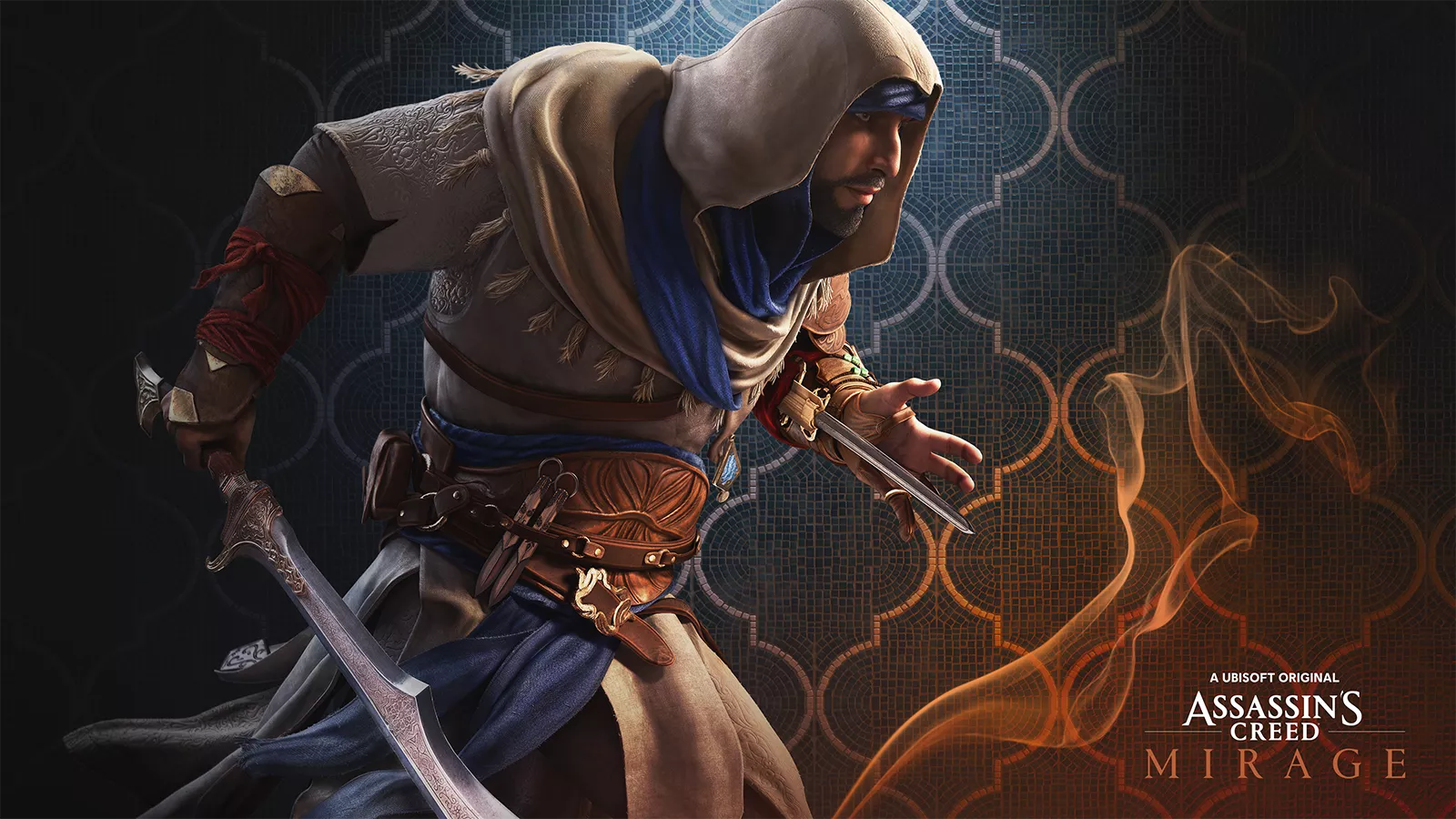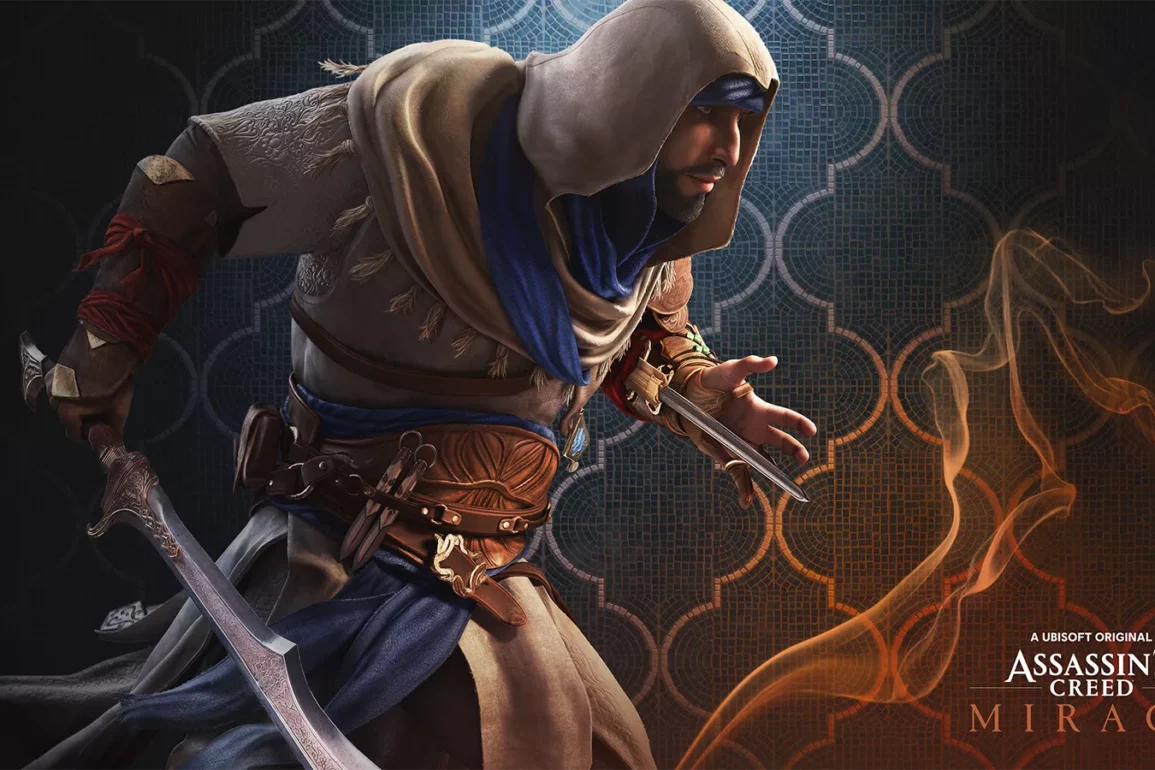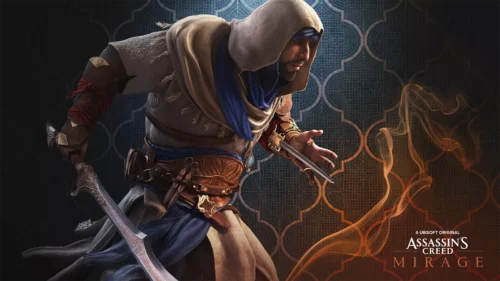Assassin’s Creed has undoubtedly become Ubisoft’s flagship franchise, garnering immense love and admiration from fans worldwide. This captivating game series has propelled the studio to new heights of success. However, it has not been without its fair share of challenges. During the era of Unity and Syndicate, the series was marred by a tumultuous period, plagued by frustrating bugs and glitches that tarnished an otherwise exceptional gameplay and narrative experience.
Additionally, the fatigue amongst players grew evident with the release of the open-world RPG trilogy of Origins, Odyssey, and Valhalla, where some felt the formula became repetitive. Despite these setbacks, the legacy of Assassin’s Creed remains strong, a testament to its ability to captivate gamers’ imaginations and transport them to thrilling historical settings.
Ubisoft’s latest installment, Assassin’s Creed Mirage, is a game that seeks to reinvigorate and regain the approval of its devoted fanbase. With Ubisoft describing it as a tribute to the franchise’s fifteen-year legacy, the game’s design meticulously reflects this sentiment. From its captivating setting to its innovative gameplay elements, Assassin’s Creed Mirage aims to capture the essence of what made the series so beloved in the first place.
However, the question remains whether Ubisoft has truly accomplished their objective and if this direction is truly the best path for the series moving forward. In this Assassin’s Creed Mirage review, we will delve into these inquiries, evaluating the game’s success in revitalizing the franchise and whether it sets a promising precedent for future installments.
Introducing Assassin’s Creed Mirage
Assassin’s Creed Mirage is an exciting new addition to the popular Assassin’s Creed franchise. Developed and published by Ubisoft, this open-world action-adventure game introduces RPG elements and places a strong emphasis on stealth and parkour traversal. Released on October 5, 2023, the game is available on various platforms including PC, PS4, PS5, Xbox One, and the Xbox Series X.
Players have the option of choosing between the Standard Edition, priced at $50, and the Deluxe Edition, priced at $60, which includes Prince of Persia-themed weapons, outfits, and cosmetics. A special bonus awaits those who pre-order the game, as they gain access to the DLC quest titled The Forty Thieves. This quest immerses players in the world of Basim as he faces off against the infamous Forty Thieves, inspired by the beloved folk tale Ali Baba and the Forty Thieves. Assassin’s Creed Mirage promises an immersive and thrilling gaming experience for fans of the franchise and newcomers alike.
In the highly anticipated sequel to Assassin’s Creed Valhalla, players are transported back to the 9th century to witness the early days of Basim Ibn Ishaq, a character that left a lasting impact in the previous game. Set in the vibrant city of Baghdad, the game delves deep into Basim’s initiation into the Assassin Brotherhood, known as the Hidden Ones. As Basim navigates the treacherous world of assassins, players will join him on a thrilling journey filled with political intrigue and danger.
The Brotherhood’s ultimate goal is to thwart the plans of the Order of the Ancients, a secretive group that wields immense power and controls every aspect of life in the Abbasid Caliphate. As players unravel the mysteries surrounding the Order, they will uncover the true extent of their influence and the lengths the Brotherhood must go to protect the people from their nefarious schemes. Get ready to step into the shoes of Basim Ibn Ishaq and embark on an epic adventure that will test your skills, loyalty, and determination in the fight for justice.

Mastering the Gameplay of Assassin’s Creed Mirage
AC Mirage successfully captures the essence of older Assassin’s Creed games, both in its setting and gameplay design. As someone who has been playing Assassin’s Creed for a long time, I find that Mirage’s gameplay is reminiscent of Brotherhood and Revelation. The game’s setting brings back memories of the first game with Altair, while also incorporating elements from subsequent games. One aspect that stands out is the skill tree system, which is similar to the RPG trilogy. However, instead of grinding for levels, skill points are earned through story progression, making the system less tedious.
Additionally, Assassin’s Creed Mirage features tools that are reminiscent of Ezio’s trilogy, adding a sense of familiarity for long-time fans. Another highlight is the implementation of the Black Box set pieces, which were highly praised in Unity. Ultimately, the core pillars of Assassin’s Creed gameplay – stealth, assassination, and parkour – form the foundation of Mirage’s gameplay loop. While the game moves away from open-world exploration and clearing out camps for rewards, it still offers plenty of collectibles for players to discover and enjoy.
Assassin’s Creed Mirage, with its multitude of gameplay mechanics, manages to blend them seamlessly into a cohesive experience. The game’s developers have done an impressive job of ensuring that all the different elements work together harmoniously, resulting in a polished package. As someone who has followed the series and appreciated the evolving gameplay over the years, I must admit that although the RPG trilogy was sometimes grindy, it still provided an enjoyable experience. However, with Assassin’s Creed Mirage, it feels like the developers have taken a step forward in some aspects while regressing in others. Despite its potential, the game seems to have missed the mark in fully capitalizing on its unique gameplay mechanics.
Ubisoft should be commended for their efforts in incorporating key elements from each era of the Assassin’s Creed franchise into Mirage. However, given the nature of the game, they had to make some compromises in order to ensure that Assassin’s Creed Mirage didn’t become overwhelming. While this approach ultimately makes the game enjoyable to play, it’s evident that certain gameplay elements have become somewhat shallow in order to fit within the game’s framework. Not all aspects suffer from this, but there are instances where it is noticeable.
Despite this, I do appreciate the game’s departure from level-based progression in favor of a more story-driven approach. That being said, I do find myself missing the impressive fighting abilities of characters like Kassandra and Eivor. Additionally, while I appreciate the increased emphasis on stealth and parkour, I can’t help but feel a bit disappointed by the limited options available when it comes to executing the game’s Black Box set pieces. Ubisoft’s effort in Assassin’s Creed Mirage is commendable, but there are areas where improvements could be made.
The Black Box missions have been a significant disappointment in the game. In previous iterations, such as Unity, these missions provided players with the freedom to approach them in various ways, utilizing a wide range of tools and options. However, in Mirage, while players still have the option to choose different paths, it is disheartening to discover that all of these missions ultimately lead to the same outcome. Regardless of the path taken, the conclusion and solution remain unchanged. This lack of variation may be attributed to the limited tools and abilities available to the protagonist, Basim, or to the game’s Investigations Quest System, which will be discussed in the following section.
The Investigation System in Assassin’s Creed Mirage is a masterfully designed quest tracking system that sets a high standard for other games to follow. It seamlessly integrates context about the player’s next objective while also providing a visually stunning representation of the relationships between targets, locations, and other relevant characters. Reminiscent of the Cult System introduced in Odyssey, the Investigation System goes above and beyond by offering additional information such as discovered clues and relevant locations. This level of depth and attention to detail truly elevates the game and makes it an immersive and engaging experience for players.
In the game, clues play a crucial role in helping the player successfully complete their mission. These clues provide valuable information that can be obtained through various means such as eavesdropping, reading documents, and examining contextual objects in investigation areas. The quest system adds another layer of flexibility, allowing players to pick up and leave their investigations at any time they wish, enabling them to complete quests in any order they prefer.
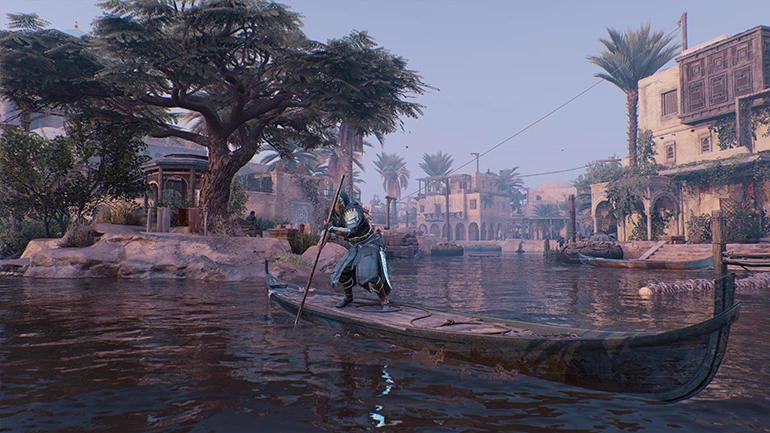
This open-endedness has had an impact on the design of the Black Box missions. These missions had to be designed in a way that didn’t restrict the player based on their abilities and tools, as it would have been impossible to predict what the player would have access to at a specific point in the game. Consequently, the designers had to create a low barrier for entry for these missions, ensuring that players could attempt them regardless of their progress in the game.
While the options for completing the Black Box missions may be limited, I still find them incredibly enjoyable and seamless to execute. The parkour mechanics in the game, although not the best in the series, still provide a fluid and thrilling experience. Combat has also been scaled back, encouraging players to prioritize stealth over direct confrontation. However, the game’s AI proves to be a major drawback.
There are countless instances where I would assassinate a guard right in front of another, yet they would remain completely oblivious to the attack. This lack of responsiveness breaks the immersion of the stealth gameplay and diminishes the importance of careful planning. Additionally, the introduction of the Smoke Bomb tool proves to be a game-changer, allowing players to easily evade pursuing guards. This means that the game punishes players less for their mistakes in stealth, further undermining the challenge and impact of the gameplay.
The inclusion of the eagle reconnaissance system in Mirage highlights a significant problem within the game. Mirage aims to promote meticulous planning and execution of assassinations, making the eagle an essential tool for players. With the ability to observe buildings from a bird’s eye view, players can easily identify guards and important areas to exploit. However, a new challenge arises in the form of the Marksman, whom Basim must eliminate before utilizing his eagle, Enkidu. Failure to do so would result in the bird being shot down by the Marksman’s arrow. This obstacle adds an additional layer of complexity to the already intricate gameplay, forcing players to strategize and adapt their plans accordingly.
In the game, Basim’s notoriety increases as he commits various crimes, dividing into three tiers. Once he reaches the first level, guards start recognizing Basim’s face, even when he is not engaged in any illegal activities. Progressing to the second level, Marksmen are stationed on towers and rooftops, and guards become more familiar with Basim’s appearance. Sometimes, civilians even spot Basim and report him to the guards.
Upon reaching the third level, guards actively search for Basim, and an elite group of hunter guards is dispatched to track him down and eliminate him. Although the game provides multiple ways to decrease Basim’s notoriety, I find this system to be a bothersome mechanic that requires me to remove wanted posters and bribe officials. While it encourages a stealthier approach to missions, I believe the notoriety system ultimately hinders the game’s pace.
Assassin’s Creed Mirage shines on the PS5 with its streamlined approach, delivering a smooth and polished gaming experience. However, the PC version did encounter occasional slow downs and frame rate drops. Despite this, we played through the entire main campaign without encountering any bugs or glitches, and had no issues finding collectibles for our review and guides. It is worth noting that some players did report experiencing bugs and glitches that hindered their progress in certain missions. Nonetheless, Assassin’s Creed Mirage stands out as the most polished game in the series at launch for quite some time. We anticipate that a Day One patch will be released to address any remaining issues.
Visual Splendor: Mirage’s Graphics
Although Assassin’s Creed Mirage may not be considered a technical marvel, it truly excels in its portrayal of the bustling and vibrant city of Baghdad amidst the vast desert dunes and plains. Sharing the same engine as Valhalla, players can anticipate witnessing familiar animations and meticulous detailing in the models and assets. Nonetheless, what sets Mirage apart is its cohesive and lively art direction, successfully breathing life into what could have been a monotonous and lackluster setting. The game’s vibrant visuals and energetic atmosphere create an immersive experience that captivates players, transforming Baghdad into a dynamic and spirited location.
Unraveling Mirage’s Compelling Story
Mirage’s story in Valhalla seamlessly weaves together the loose ends of the game’s overarching plots. While prior knowledge of Valhalla is not necessary to enjoy Mirage, having background information on who Basim is and his role in the previous game does enhance the player’s journey. However, even without this prior experience, Mirage’s story stands strong on its own, delivering a compelling narrative of revenge and redemption. The main campaign story may follow a somewhat formulaic structure, but it is executed with such skillful pacing and captivating storytelling that players won’t mind embarking on this journey. Mirage’s narrative in Valhalla may not be groundbreaking, but it is certainly well-told and engaging.
A Symphony of Sound in Mirage
Ubisoft deserves praise for their exceptional use of modern Iraqi and Arabian music in creating the sounds and tracks for this game. Often overlooked, Ubisoft has proven themselves as leaders in ambient sound design. The bustling streets of Baghdad are brought to life with the constant presence of ambient music, idle chatter, and the calls of merchants vying for customers. The town criers proclaim the latest news and events in the Caliphate, while the grunts and cries of animals add an authentic touch.
Although the game may not have NPCs with detailed lives and schedules like Skyrim or Red Dead Redemption, the inclusion of these ambient sounds makes Baghdad feel like a truly inhabited city. Ubisoft’s attention to detail elevates the overall gaming experience and immerses players in the rich culture and atmosphere of the game’s setting.
One aspect of this game that I find slightly bothersome is the music and sound design. There are moments when the music abruptly changes without any transition as the player character’s condition changes. For example, high-intensity music suddenly disappears when Basim manages to avoid detection, and is replaced by a more serene tune. Additionally, the battle music abruptly drops when Basim deals the final blow to a guard, and the serene tune returns. These sudden changes can break the immersion for me, and I hope that Ubisoft addresses this issue in a future patch to provide a more seamless and immersive gaming experience.
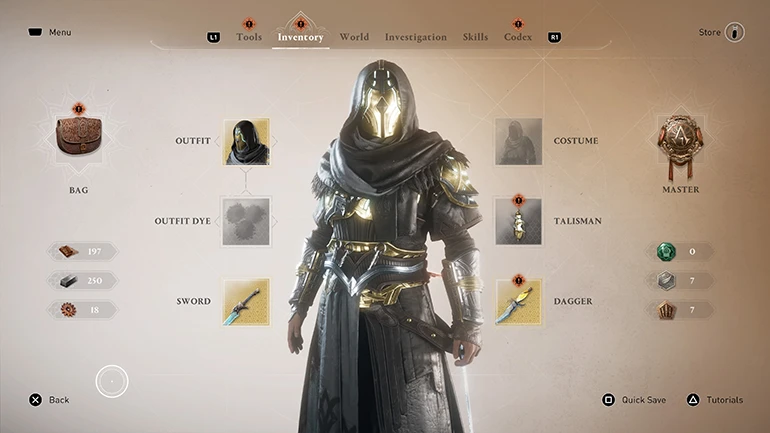
Final Verdict
Our time playing Assassin’s Creed Mirage was overall enjoyable, although there were some aspects of the gameplay that felt watered down. It was clear that certain elements were included just for the sake of being in the game, which slightly hindered our enjoyment. Having experienced the full potential of these gameplay elements in previous titles, we knew how much they could enhance the overall experience.
Nonetheless, Assassin’s Creed Mirage captures the nostalgia of the earlier games. It takes us back to the “glory days” of Assassin’s Creed as a more linear and streamlined experience, with unnecessary elements trimmed out. It finally feels like a game that can be completed, unlike the bloated and grindy Valhalla. While old-school fans will find joy in this return to the series’ roots, those who joined later in its lineage may find the game a bit too traditional for their liking.
Editor’s Note: GameHaunt has recently received review copies of Assassin’s Creed Mirage for both the PS5 and PC. However, it is important to note that these copies did not have any influence on the review and score of the game. GameHaunt remains committed to providing unbiased and objective reviews to its readers.
In addition to the review, readers can look forward to more Assassin’s Creed Mirage content such as news, updates, and guides exclusively on GameHaunt. To stay up-to-date with the latest gaming and esports articles, readers can also subscribe to the gaming newsletter for weekly updates.
